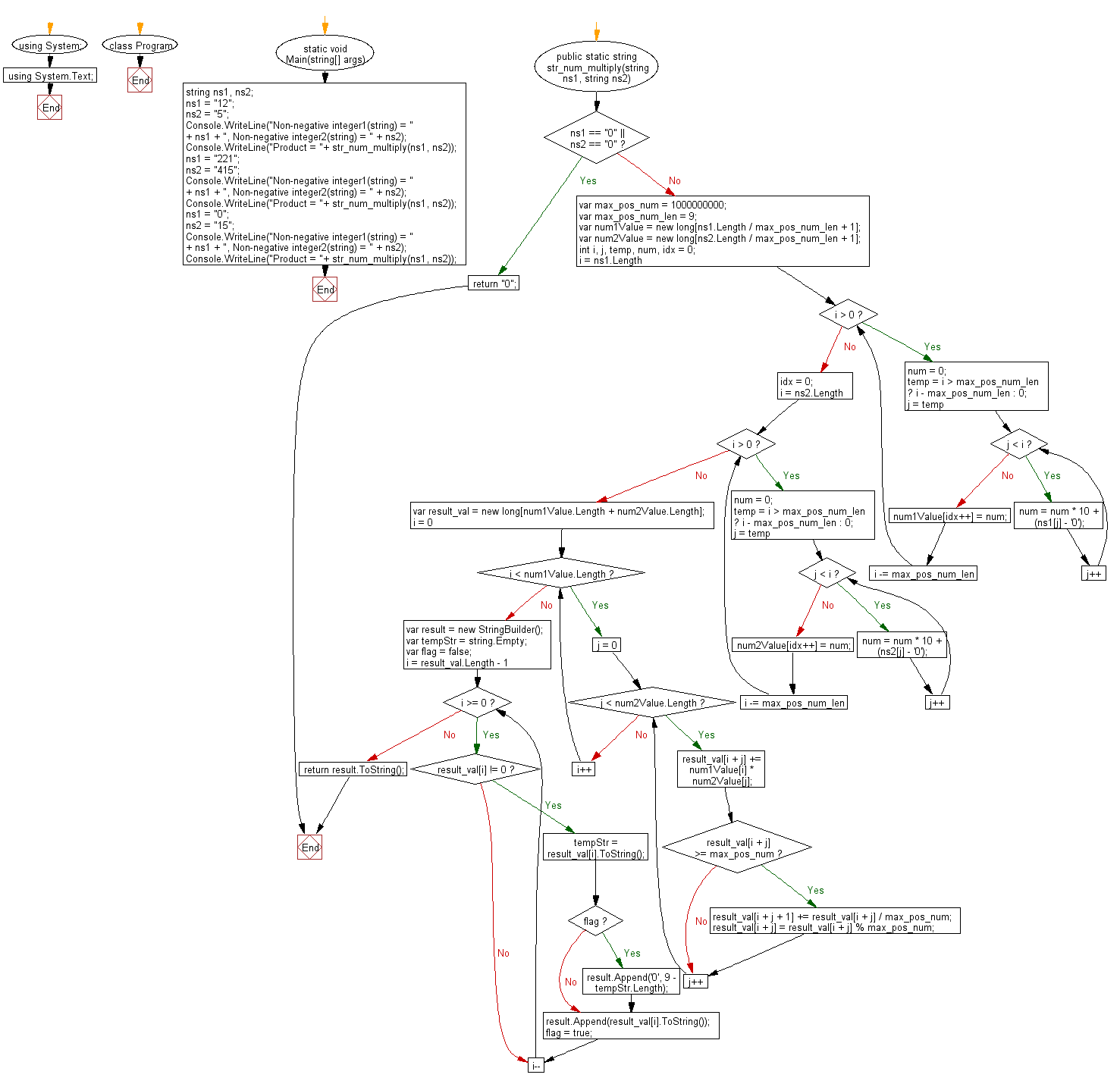C#: Create string represented product of two non-negative integers
Write a C# program to return the string representation of the product of two non-negative integers n1 and n2, given two non-negative integers n1 and n2.
Sample Solution:
C# Sharp Code:
using System;
using System.Text;
namespace exercises {
class Program {
static void Main(string[] args) {
string ns1, ns2;
ns1 = "12";
ns2 = "5";
Console.WriteLine("Non-negative integer1(string) = " + ns1 + ", Non-negative integer2(string) = " + ns2);
Console.WriteLine("Product = "+ str_num_multiply(ns1, ns2));
ns1 = "221";
ns2 = "415";
Console.WriteLine("Non-negative integer1(string) = " + ns1 + ", Non-negative integer2(string) = " + ns2);
Console.WriteLine("Product = "+ str_num_multiply(ns1, ns2));
ns1 = "0";
ns2 = "15";
Console.WriteLine("Non-negative integer1(string) = " + ns1 + ", Non-negative integer2(string) = " + ns2);
Console.WriteLine("Product = "+ str_num_multiply(ns1, ns2));
}
public static string str_num_multiply(string ns1, string ns2)
{
if (ns1 == "0" || ns2 == "0") { return "0"; }
var max_pos_num = 1000000000;
var max_pos_num_len = 9;
var num1Value = new long[ns1.Length / max_pos_num_len + 1];
var num2Value = new long[ns2.Length / max_pos_num_len + 1];
int i, j, temp, num, idx = 0;
for (i = ns1.Length; i > 0; i -= max_pos_num_len)
{
num = 0;
temp = i > max_pos_num_len ? i - max_pos_num_len : 0;
for (j = temp; j < i; j++)
{
num = num * 10 + (ns1[j] - '0');
}
num1Value[idx++] = num;
}
idx = 0;
for (i = ns2.Length; i > 0; i -= max_pos_num_len)
{
num = 0;
temp = i > max_pos_num_len ? i - max_pos_num_len : 0;
for (j = temp; j < i; j++)
{
num = num * 10 + (ns2[j] - '0');
}
num2Value[idx++] = num;
}
var result_val = new long[num1Value.Length + num2Value.Length];
for (i = 0; i < num1Value.Length; i++)
{
for (j = 0; j < num2Value.Length; j++)
{
result_val[i + j] += num1Value[i] * num2Value[j];
if (result_val[i + j] >= max_pos_num)
{
result_val[i + j + 1] += result_val[i + j] / max_pos_num;
result_val[i + j] = result_val[i + j] % max_pos_num;
}
}
}
var result = new StringBuilder();
var tempStr = string.Empty;
var flag = false;
for (i = result_val.Length - 1; i >= 0; i--)
{
if (result_val[i] != 0)
{
tempStr = result_val[i].ToString();
if (flag)
{
result.Append('0', 9 - tempStr.Length);
}
result.Append(result_val[i].ToString());
flag = true;
}
}
return result.ToString();
}
}
}
Sample Output:
Non-negative integer1(string) = 12, Non-negative integer2(string) = 5 Product = 60 Non-negative integer1(string) = 221, Non-negative integer2(string) = 415 Product = 91715 Non-negative integer1(string) = 0, Non-negative integer2(string) = 15 Product = 0
Flowchart:

Go to:
PREV : Write a C# program to divide two given integers (dividend and divisor) and get the quotient without using multiplication, division and mod operator.
NEXT : Write a C# Sharp program to compute the sum of the positive and negative numbers of an array of integers and display the largest sum.
C# Sharp Code Editor:
Improve this sample solution and post your code through Disqus
What is the difficulty level of this exercise?
Test your Programming skills with w3resource's quiz.
